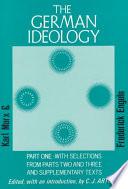The German Ideology (1845/46)
Context: The fact is, therefore, that definite individuals who are productively active in a definite way enter into these definite social and political relations. Empirical observation must in each separate instance bring out empirically, and without any mystification and speculation, the connection of the social and political structure with production. The social structure and the state are continually evolving out of the life-process of definite individuals, but of individuals, not as they appear in their own or other people's imagination, but as they really are; i. e. as they are effective, produce materially, and are active under definite material limits, presuppositions and conditions independent of their will.
The production of ideas, of conceptions, of consciousness, is at first directly interwoven with the material activity and the material intercourse of men, the language of real life. Conceiving, thinking, the mental intercourse of men, appear at this stage as the direct efflux of their material behaviour. The same applies to mental production as expressed in the language of the politics, laws, morality, religion, metaphysics of a people. Men are the producers of their conception, ideas, etc. — real, active men, as they are conditioned by a definite development of their productive forces and of the intercourse corresponding to these, up to its furthest forms. Consciousness can never be anything else than conscious existence, and the existence of men is their actual life-process. If in all ideology men and their circumstances appear upside down as in a camera obscura, this phenomenon arises just as much from their historical life-process as the inversion of objects on the retina does from their physical life-process.

